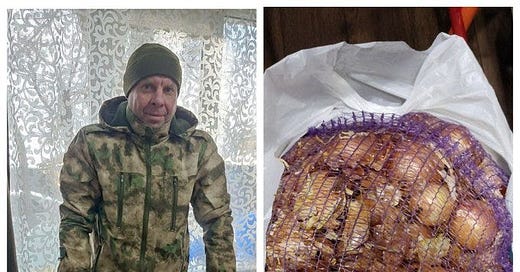The man in the picture is the “enemy.” If you ever met him in life, before Putin’s war, he’d be the kind of fellow you’d like. He could fix anything, preferred pulp fiction novels to more learned stuff, and whiled away his evenings drinking tea and popping outside for a smoke during commercial breaks.
Today, his right knee is mashed up like an old, deflated soccer ball — I don’t know what it looks like, but it’s awful according to what they say — and his life has been transformed from the above into immobility, nagging pain, and sleeplessness because of the pain — and probably PTSD. According to the doughy-faced Putin, this guy is guaranteed $32,000 to help him adjust to life as a person now reduced to a hell that differs only in the kind of pain but not the amount of pain depending on whether he is sitting or standing.
All over Russia, they proudly proclaim, and most Russians, if asked, that the “heroes” injured in the war of genocide will be paid that amount of money. Putin promised, after all.
A Russian mobilized man was given two buckets of carrots and a bag of onions instead of 3 million rubles for his being wounded. Oleg Rybkin, a mobilized man from the Volgograd region, was denied payment of 3 million rubles ($32,600) after being wounded.
Local authorities gave his family two buckets of carrots and a bag of onions instead, his wife Irina told Mozhem Obyasnit. According to her, 45-year-old Rybkin was drafted to the front on September 25, 2022, just four days after Russian President Vladimir Putin announced mobilization. The summons was handed to the man at his job. Two hours after his arrival at the military enlistment office, he was sent to the firing range without a medical examination. The training lasted about three weeks, and by the end of October, Rybkin was already in the trenches on the front line (Anton Geraschenko-X).
Rybkin needs a knee replacement. He got carrots and onions. The soup his wife makes with the vegetables will be tasty, but it won’t ease Oleg’s pain.
It seems that farmers in many parts of Russia are “obligated” to provide these little sacks of encouragement. Who doesn’t like a nice bowl of potato soup with carrots? After all, maybe while Oleg and his family are gorging themselves, they will set aside their selfishness in demanding compensation for his injury. I guarantee you that this is how the local authorities, usually obligated to pay the thousands of Olegs all over Russia, rationalize not giving him money.
“At least you are alive, fellow. We gave that nice sack of vegetables for free. Now enjoy it and stop being so greedy.” Oleg seems to be the kind of guy who will shut his mouth and take the potatoes and onions. These kinds of guys are the suckers that Russia’s rulers have been abusing for centuries.
Russia’s ruling class, the system, has a masterful talent for making people do things they don’t really want to do.
“He has severe pain, his knee does not bend, and he cannot walk without crutches. He is on painkillers and sleeping pills,” his wife said.
“I was at work, they brought it to my mother-in-law,” she said.
“Local farmers — those who grow it here — are obliged by the administration to ‘help (Russian Solider Injured in Battle).’”
In Russian, they say, “ti obyazan.” “You must do that.” Russians are so pressed upon by the government throughout their lives, so forever “obligated” to do or tolerate, that when this word crops up in life between everyday people, it results in very adverse reactions. Misusing “you are obligated” between strangers can kick off a fight in a relationship, and it will almost certainly lead to an argument. The sentiment is: “Who are you to obligate me to do anything?”
After all, the only “person” who can obligate (oppress) Russians is the state. The ubiquitous sense that people are always required to do or tolerate so wears them down that it kills any desire someone might have to be kind and helpful to strangers. If someone falls on the ice, most people will keep moving along lest they feel “obligated” to help.
Most people will never get involved in anything in the public space because they want to avoid the sense that they are obligated. There is also the fear that if they get involved, the police will come and obligate them to get more involved, which could result in them being fined for something the police happened to find in their documents. Playing the role of the good Samaritan in Russia is not favorable in the eyes of the state.
Many Russian-speaking foreigners have stumbled upon this word more than once, and the reactions for many have been similar to stepping on a mine.
“You are obligated…”
“Who the hell are you to ‘obligate’ me? How dare you talk to me that way?!”
The foreigner — and that was me in my first decade and a half in Russia before I figured out this nuance — scratches his head and thinks, “What the hell just happened?”
Oleg Rybkin, no fan of the farmers now because his injury obligated them to give those sacks of vegetables for free, is now obligated to eat his soup and keep his mouth shut.
“Did you take the onions?”
“Yes, but..”
“But nothing. When you took them, you agreed to shut your mouth. Now go home.”



